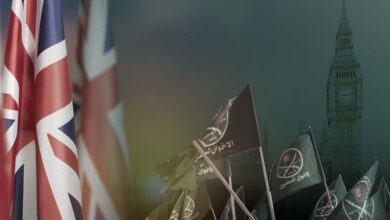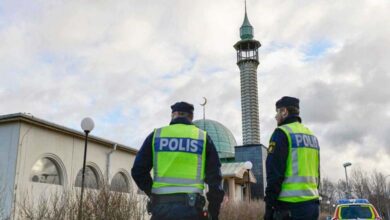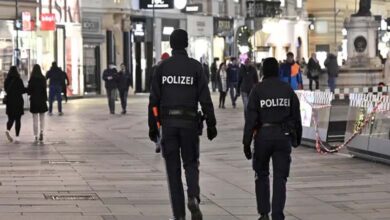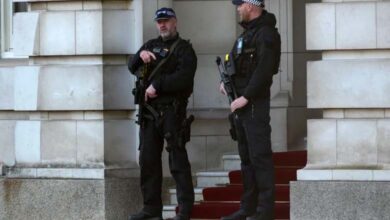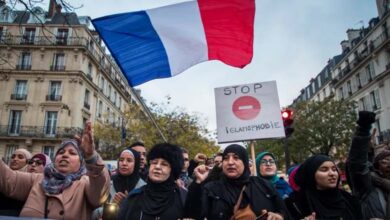After a Peaceful Night… Did the Far Right in Britain Fail to Incite Chaos and Hatred Against Muslims?
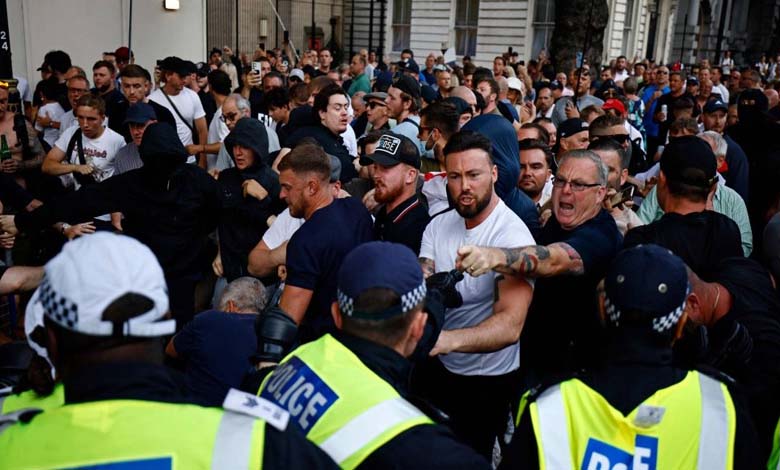
Many expected Wednesday night to be another night of violence across the United Kingdom, where far-right protesters had threatened to target asylum centers, law offices, hotels housing migrants, Muslims, and mosques. Shopfronts were shuttered, and thousands of police officers were deployed nationwide. However, the efforts of the British police succeeded in containing the violence until Friday, as reported by the American newspaper “The Wall Street Journal.”
-
Far-Right Targets Mosques in Britain… Muslims Live in Great Anxiety
-
The First Far-Right Entity Added to the EU Terror List: What Do You Know About “The Base”?
The Worst Unrest
Instead, tens of thousands of counter-protesters took to the streets in cities from London to Sunderland in the northeast of England, outnumbering the hundreds of far-right protesters responsible for the worst civil unrest the country has seen in over a decade. There were few reports of violence, with some crowds holding signs that read “Refugees Welcome Here” and “Love + Unity.”
Last Thursday’s peaceful night largely provided hope that the worst of the unrest was over after a week of violent riots sparked by the death of three children killed by an attacker wielding a knife, who was falsely reported on social media as a migrant who had illegally entered the UK. The Commissioner of the Metropolitan Police in London, Mark Rowley, said on Thursday, “I am really pleased with how things have gone.”
New Concerns
According to the newspaper, as fears grew that far-right protests could flare up in the coming days, government officials were cautiously optimistic that the strategy of quickly prosecuting violent offenders and publicly naming them was paying off. In recent days, courts have rushed cases against dozens of people who were arrested for fighting with the police or destroying shops.
A man from Liverpool was sentenced to three years in prison for attacking a police officer, while two others were sentenced to 20 and 30 months. A 69-year-old retiree, who was carrying a wooden bat when officers arrested him, was jailed for two years and eight months. Among the defendants was a 14-year-old boy.
The front page of the British newspaper The Sun published photos of 15 jailed protesters with the headline “Nailed and Jailed.”
Prime Minister Keir Starmer, who was the chief prosecutor and jailed hundreds of rioters in 2011, the last time the country saw unrest on this scale, said: “This is the swift action we are taking. If you provoke violent chaos in our streets or online, you will face the full force of the law.”
Police Minister Diana Johnson said, “What we saw last night was the vast majority of law-abiding people in this country expressing the view that we live in a tolerant Britain.”
Johnson added that it was still too early to say whether the protests would fade away. There could be more chaos over the weekend as far-right Facebook groups plan more rallies across the country.
Counter-Protests
Weyman Bennett, joint national secretary of Stand Up to Racism, a group that helps organize campaigns against the far-right, said more than 100 counter-protests are planned for the weekend.
Bennett added that he still expects more clashes as far-right groups continue to embolden themselves.
Meanwhile, tech mogul Elon Musk continued his war of words with the UK government over the riots. Musk, who had predicted a civil war in the UK due to the recent surge in immigration, on Thursday shared a fake post about the UK government’s plans to open a penal colony on the Falkland Islands to house anti-immigration rioters. Musk later deleted the post, which, according to screenshots by a British journalist, was seen by nearly two million people.
He also said that the UK government was acting like the “woke Stasi” (a reference to the secret police in East Germany during the Cold War) by promising to prosecute those who incite hatred online.
The Start of the Crisis
The unrest began shortly after an attacker last week attacked a children’s dance class in Southport near Liverpool, killing three young girls. The 17-year-old attacker was falsely identified on social media as a man named Ali Shakati, who had allegedly entered the country illegally and was on the government’s terrorist watch list.



